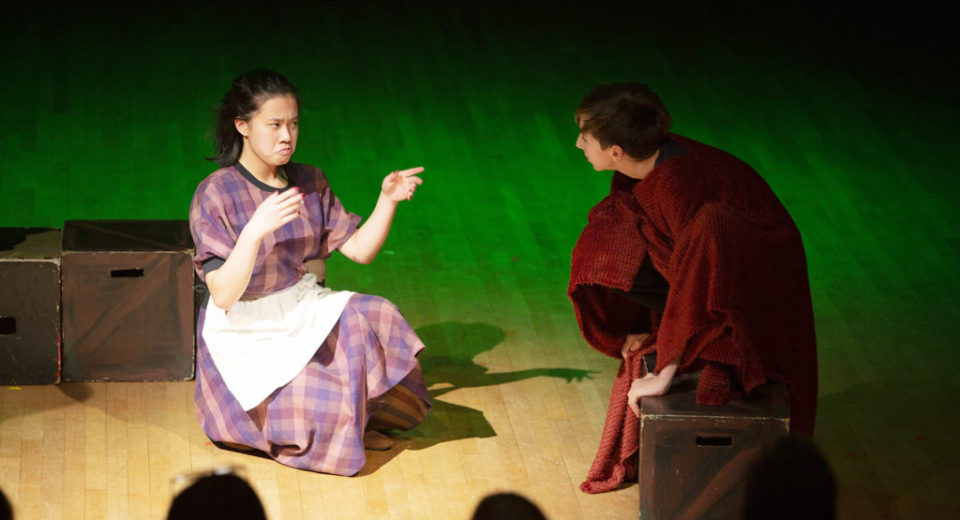In November 2019, we visited our Laboratory Troupe to see what goes on in a typical class. Like all of our Theatre programs, what goes on from class to class can vary greatly, but this behind-the-scenes peek sheds some light on just what students get up to in this highly collaborative Pre-Professional Theatre Troupe.
Class Format
Instructor Laura McLean starts the class with greetings and a question. During our visit she asks her students to share their favourite part of creating theatre. Answers vary, and we quickly get a sense of the personalities in Lab Troupe this year.
“I enjoy original stuff and I like improvising,” says Duncan. “I like all the different things you can come up and how they’re all so different and cool. If you’re performing someone else’s scene you feel really good once you’ve presented it. But if it’s yours, you feel even better because you’re proud of what you’ve done.”
“My favourite part is writing and making new worlds, new characters,” says Veronica.
“I like Lab Troupe because it’s a way to express yourself, not just in acting, but in actually writing scripts,” says Charlie. “You have more creativity that way. You can mold a scene in a way that you couldn’t do performing a script.”
With two three-hour sessions per week, Laura’s curriculum is robust but flexible. She summarizes their activities for the day: After a quick warmup, the class will discuss Beamed Up! (a scene the class is collaborating on for Winter Shorts). Next? Some group work so Laura can touch base with everyone about the various scenes they are writing for Winter Shorts. Students are at different points in their drafts, so the one-on-one feedback time is crucial. If there’s time? They’ll start blocking their scenes.
Writing and Collaboration
In previous classes, the students decided on a setting and characters for a five-person scene. Then they took those characters and improv’d how the scenario might play out. Using notes from that session, each student went home to write a script.
Today is all about collaborative writing and merging those scripts into a new draft. As they prepare to read the versions, Laura reminds everyone to be respectful and explains how they will merge the scripts into a new master version.
“Don’t interrupt somebody else’s ideas when someone else is sharing something,” she says. “Respect each other, and remember that this is going to be a give and take. Because we have five pretty full scripts here, and we’re going to merge them together. Overall, it will probably get larger; we’ll probably want to keep lots of things from each different script.”
In keeping with collaborative spirit, Laura also reminds her students not to be precious about their work. “Cutting a line or not using something that you’ve written in your draft is no comment on whether it’s not good. It’s just about what are we finding that’s working for this project.”
The script readings begin and students make notes on what they enjoy from each version. Once they’re through the readings, they start picking out lines from each version, placing all of their favourite moments into a fresh document.
Throughout this process, Laura reminds her students about how the script should be formatted, and makes recommendations for how to write stage directions or notes to actors. She also points out when lines make sense, or whether or not the audience can infer something. The script gets more cohesive and polished through this process.
It was so insightful to watch the class collaborate on Beamed Up! Watching their performance at Winter Shorts one month later, it’s clear that the class put so much energy and dedication into the scene, and they had a brilliant time on stage—both for this scene and the many others they wrote and performed.
We look forward to seeing what Lab Troupe comes up with for Expressions Festival in May!
______________
Auditions for Laboratory Troupe take place annually. Check our auditions page for the latest schedule and to download your application package.
Read more in our Lab Troupe series:
Q&A with Lab Troupe student Duncan Murch
Introduction to Lab Troupe
